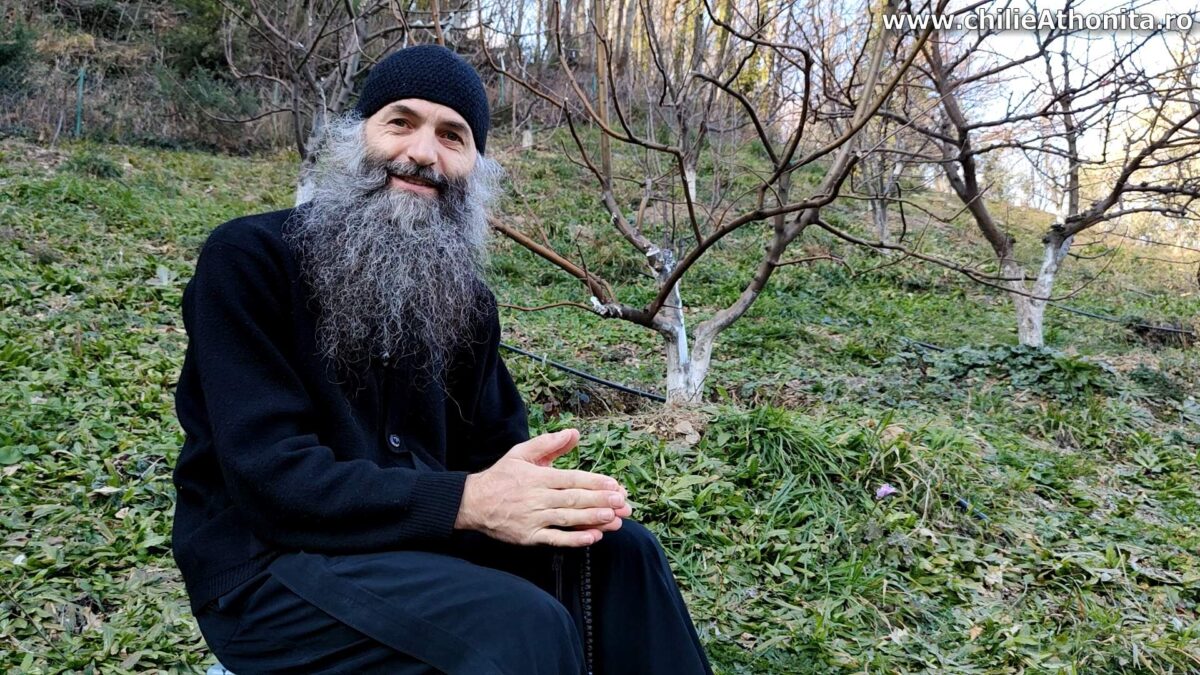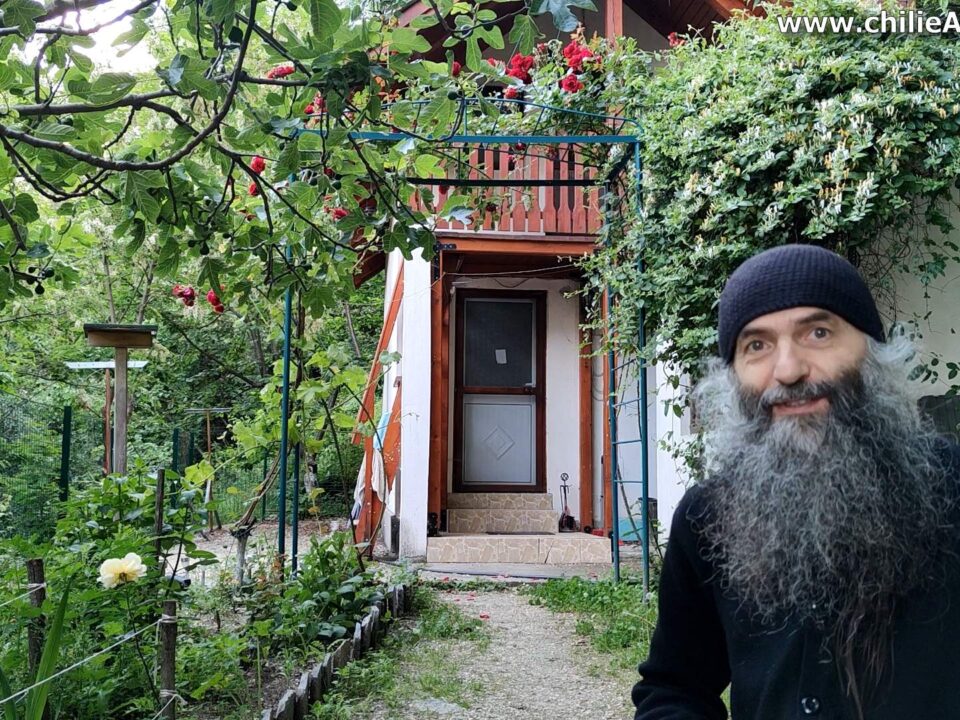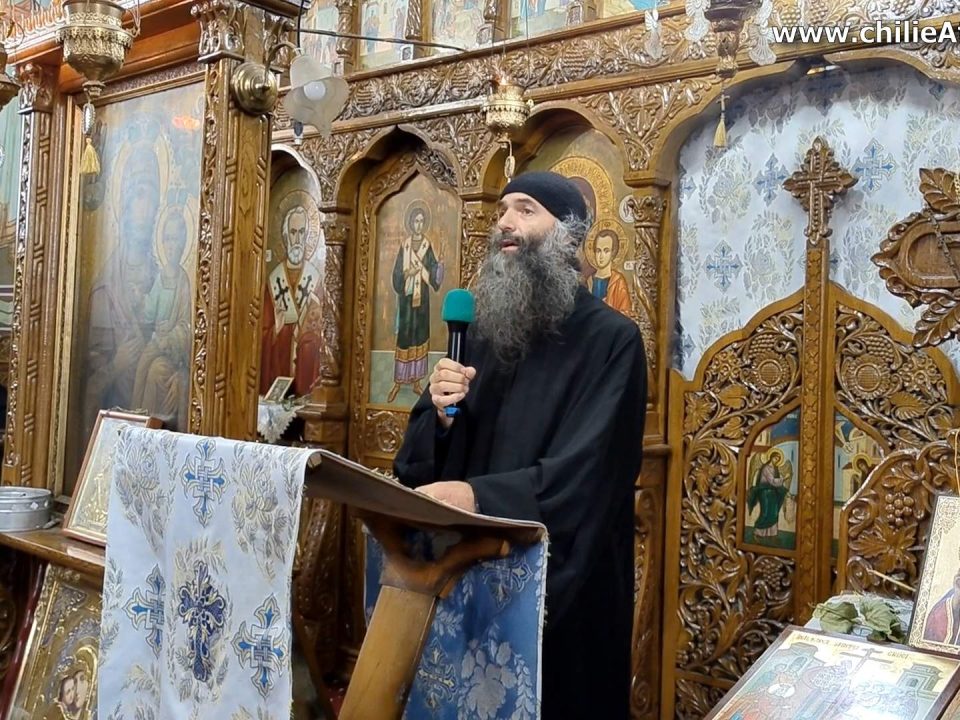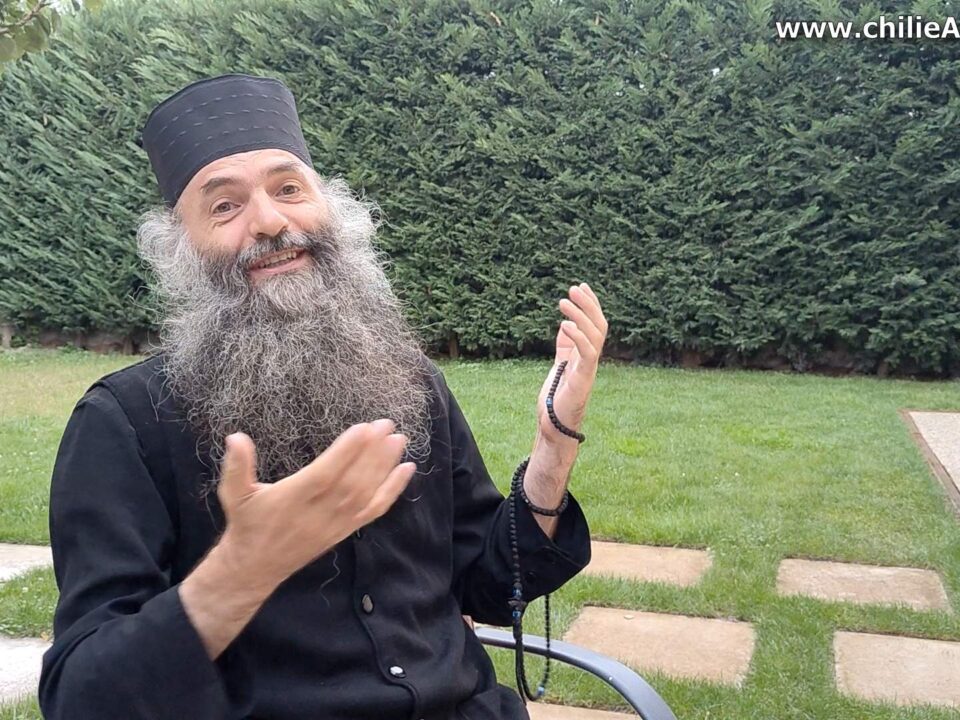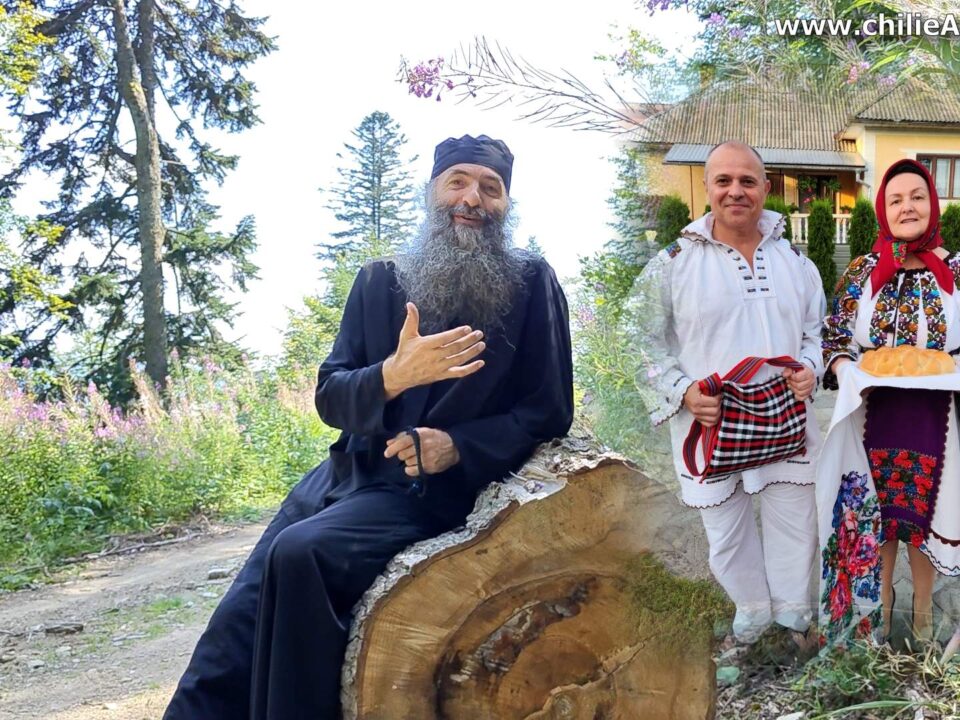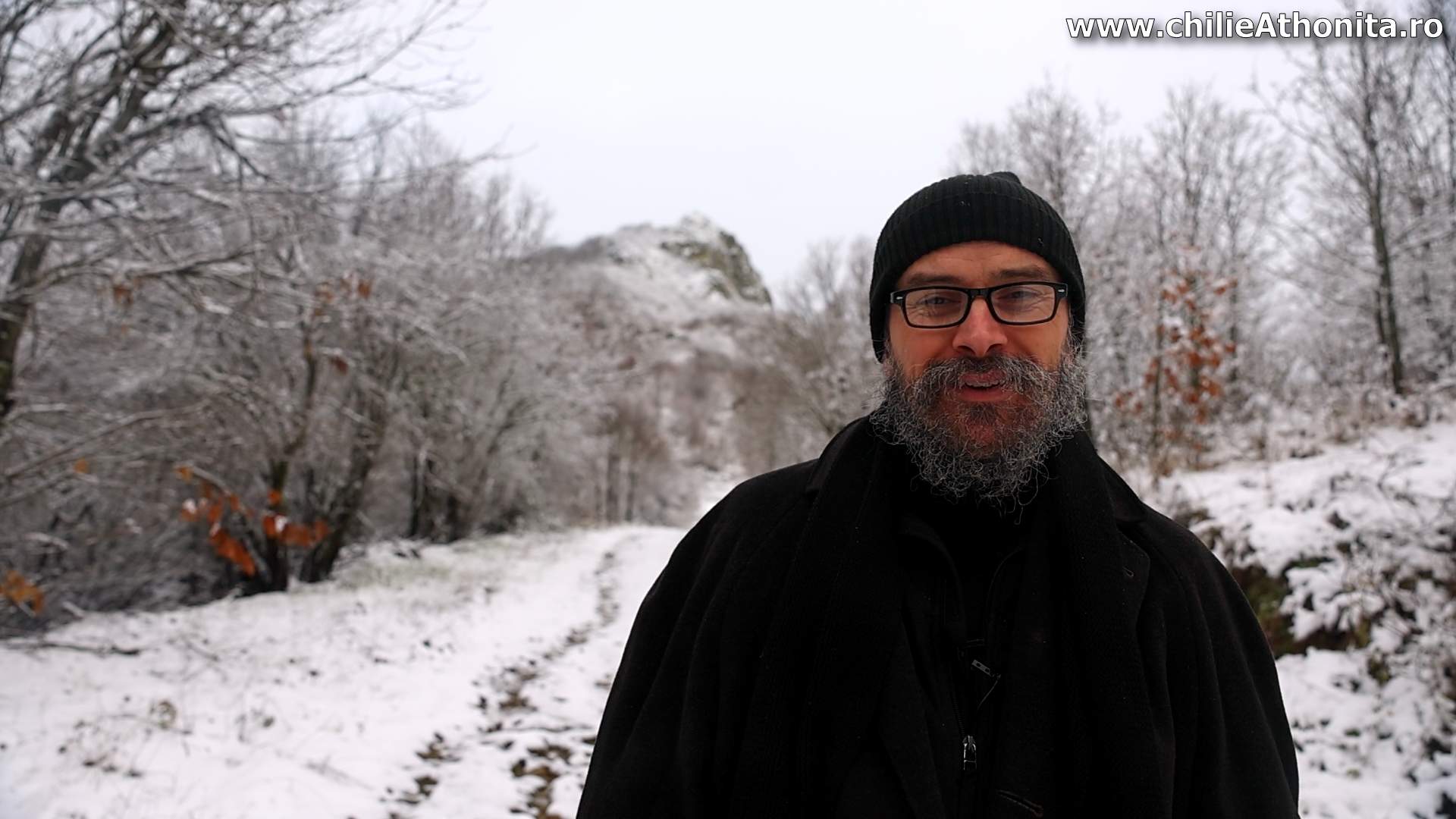
Orthodoxy: Definition, Analogies, Heresies – Father Theologos
21 February 2023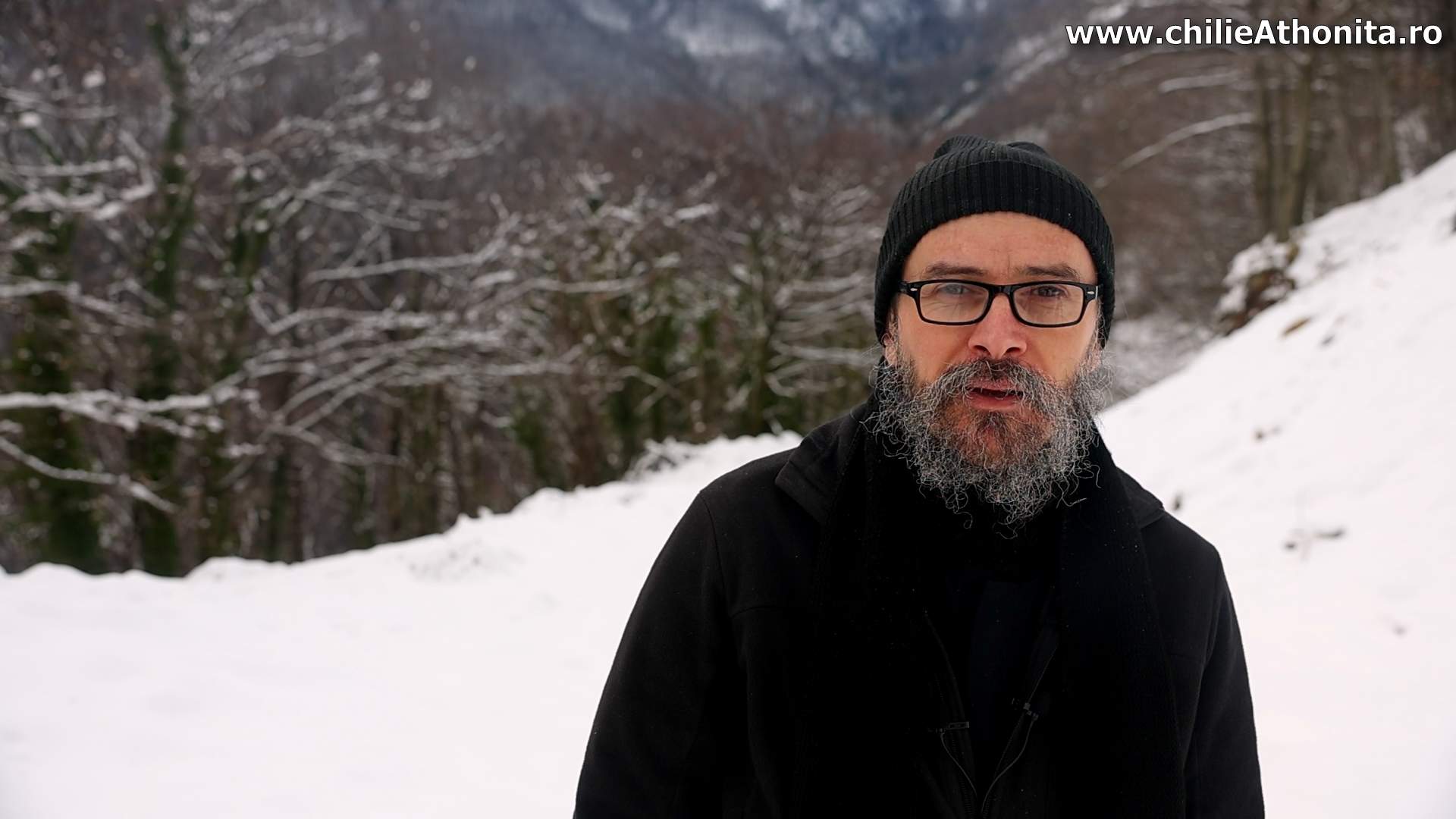
Icons and the Visual in the 21st Century – Father Theologos
28 February 2023Listen to a word with grace and full of exhortations, of Father Pimen Vlad, to struggle more in Great Lent. Of course, the wonderful events that help us to have the necessary zeal for Great Lent are not forgotten either.
Enjoy!
Here we are, my dear ones, we see each other again! Last time we saw each other in the video with the snow. You saw beautiful snow, a bit of cold, now you see grass. Here, the snow doesn’t last. When it snows like this, it lasts for a week, as the sun melts it. Immediately the grass doesn’t even dry out – it recovers. A flower starts to come out, look, already there, if you notice, a couple of them, a kind of crocus. It resembles the flowers back home, like anemones. So different flowers, they begin to herald spring. Yes!
What else to talk about now? There are still a few days left and Great Lent begins, as we call it. This is not just about its length, that it’s long. It also refers to his greatness. Lent – the fast before the Crucifixion, Burial, and Resurrection of the Savior. So really great! Great for all that pertains to this mystery of our salvation. Yes.
You saw that we have different fasting periods. Lighter, shorter ones; we see that the fast of the Holy Apostles has a few days, after that is the fast of the Mother of God which is a little harsher – 2 weeks, but it is so, as they say, without as many allowances as in the Nativity fast, as we call it, of Christmas. Then there are allowances to eat fish on certain saints’ feast days. But, in the fast of the Dormition of the Mother of God no, because it is for the Dormition of the Mother of God, for her transfer to Heaven and there are 2 harsher weeks of fasting.
So is Great Lent, as we call it, the Lent of Resurrection. As they say, it’s a bit harsher. In Romania you are only allowed to eat fish two times: for the Annunciation and for Palm Sunday – at the Savior’s entrance into Jerusalem. Here, in Athos, only once: at the Annunciation.
What do we do to prepare a bit for fasting? Not that we should prepare, but let’s not, on the last days now, be eating day and night and drinking, thinking that the fast is coming and we won’t be able to do it after that! Do you see how beautifully the Church, the Holy Fathers, ordained it for us? Before the beginning of the fast, for the last three weeks, there is a week in which we eat everything, of course, in the monastery, without meat. By everything, we mean you eat cheese, eggs, milk, fish, all of that.
After that, there is a normal week, in which Wednesday, Friday are fast days, and in our monastery also Monday. So it’s normal, with the days intersected like this, fast days and non-fast days. And after that, the last week – now – is cheese week. That is, meat is cut for everyone including for those in the world. Dairy, cheese, eggs, fish, are eaten this week.
But not in an exaggerated way. That is, we try to accustom the body to the fast that begins, so that it does not seem hard on us after being gluttonous this week. No! It’s a preparation. Easy. We reduce a little, not to reach satiety, not too much of everything, so easily, we calm down, as they say this week, to go into fasting a little prepared.
We give up a little bit on certain entertainments of all sorts, we slowly prepare for fasting. And as fasting begins, let us all try, except for the sick, who exaggeratedly cannot, or small children, the rest of us let’s all try to keep fasting. You don’t realize the value of fasting! Apart from helping us a lot, by fasting, by giving up all meats and everything else, the mind clears. The body is no longer so gluttonous. You can fight passions more easily. The mind is clearer: you can pray more. That is, you can control everything a little bit.
And of course, combined with prayer. And slowly we start fasting, gently. In our monasteries, Sunday evening – before the first week of fasting – ends with Compline and we all ask forgiveness of each other and the last meal ends on Sunday evening.
After that, the special ordinance of fasting begins: with more prayers until Wednesday. So you don’t eat anything until Wednesday, you don’t drink any water. That’s the custom in monasteries. Of course, for each according to their situation. There may be some sick people who can’t last that long. They hurt themselves. Or they are undergoing certain treatments.
But in general, for those that can, the fast is until Wednesday. There is no Divine Liturgy until Wednesday. On Wednesday, the Divine Liturgy of the Presanctified Gifts is celebrated according to the custom, and everyone receives communion, unless your spiritual father does not allow you; If you have certain sins that stop you from taking it.
Otherwise, everyone prepares a little to receive communion, that’s what is in the monastery. After that, again, from Wednesday they all take communion, there is the meal after Liturgy and after that, again until Friday, nothing is eaten, no water, nothing. And again – on Friday, the Divine Liturgy of the Presanctified Gifts is celebrated and again they all take communion. After that, on Saturday, back to normal.
Saturday Liturgy, Sunday the same. Those in the world, because you don’t have, especially in the villages, the Divine Liturgy (compared to a monastery) – you usually take communion on Sunday. You fast the first week, you struggle, and especially on Friday and Saturday, before Sunday, this week all priests listen to confessions, maybe some even from Thursday. According to custom.
It’s the Great Canon then: try, those of you who can, to go to monasteries or churches where it’s done. In the first week of Lent when you also have the Great Canon on certain days, it is a very beautiful ordinance, where always, at every stich of the canon it is said:
Have mercy on me, O God, have mercy on me! That is, we ask for God’s mercy. And it’s really nice to participate in this, especially with your belly a little emptier, give it a try! Come on!
Not like in a monastery, but at least eat fasting foods and as little as possible, depending on everyone’s work. It’s not mandatory, but if you can keep it from morning till noon, it’s not bad. That is, restrain the body a little, let it become lighter, the mind clearer, so that we can pray, and in this way try nicely to keep the fast. And try to get along with everyone around you. Not only to restrain from food.
And another thing about food: it’s not that if I eat fasting foods I fast. Don’t get gluttonous: I mean I fast but I never eat until I can’t anymore! Always to still be able to eat but to stop, so that there is a bit of restraint.
After that, let’s forgive everyone around us and ask forgiveness from them so that we can take Holy Communion. A little kindness, a bit of love, that is, to fast also in this way. And let’s try a little prayer. More prayers. A few prostrations in the evening, in the morning! To make a little effort!
And so let’s do it, so that arriving on Sunday after the first week you can take Holy Communion. You don’t realize what Holy Communion means after a bit of toil and fasting. It’s joy, as they say. It also gives us strength to move forward. And so, in this way you fight to carry out the whole fast to the end. Because some also say:
“Eh, [fast] one week at the beginning and one at the end.”
And I really remember, it was Father Cleopas, after someone said that to him, he said:
“Well, wait, but who makes a bridge over a water, a river, let’s say 50 m long, and makes 10m of bridge on one side and 10m on the other side? How do you cross the rest of the river?
So to truly have the joy of the Resurrection you have to fight a little. To be weary. To restrain yourself. Because what happens? If all these days, until the Resurrection, you struggle to keep the fast, even if it’s hard, even if I don’t know; you are tempted, you crave [things]… But you give up on all that. Think when you reach the Resurrection with how much joy you get then! You arrive at the Resurrection and look back that you struggled as best you could to restrain yourself. To fast, to restrain yourself a little, not to eat too much, to treat others more nicely, to ask forgiveness even more often in the family and to others. And where you work. To change something in your life! To renounce certain passions that control you, this is how joyfully you come to the Resurrection of the Lord. I mean, you go, “Lord, I did what I could, I fought… Even though I fell, I got up. I mean, I kept struggling.” So we have to fight a little bit. Otherwise we are not crowned, as they say, God looks:
“Okay, I’ll help you, but you fight a little. Move your hands a bit!” As they say, you’re in the water: they throw you the lifebuoy, but grab onto it a little, hold on for a bit. Do what you can humanly. And then God does the rest. So that we can enjoy the Lord’s Resurrection. Let’s go a little more often to church now in this Lent, because there are more frequent, more beautiful services, different services. They are different, they have a special beauty. It is the preparation for the Resurrection of the Lord, they all remind us of the Passion of the Savior, that is, everything He suffered for us.
Because there is no resurrection without the cross, dear ones! You know! That is, in order to rejoice in the resurrection you must go through the cross. This is how the Savior showed us, that is, through a bit of effort.
It doesn’t mean everything is going to be easy. It’s going to be harder, that’s the cross. It means it’s hard, but you fight, you weary, you hurt but you insist. To be hungry but to struggle to restrain yourself. Let the other swear at you, say nothing. Still pray for them, that is, let’s transform everything for the better, even if it’s hard! That’s cross. One more prayer, in the evening again, if possible in common in the family. Different prayers, something there, together with all of them. One reads aloud, the others listen. Let it be such a union. And in this way we can move forward easier, easier and draw closer to God.
Because otherwise what do we do? If we all eat meat, of all kinds, until the Resurrection, what joy do you feel at the Resurrection? Even bodily, [what joy is there] when in fact you ate the same thing the day before. What’s the difference? Plus, the spiritual side, to confess, to take communion, to pray another prayer. To give more alms. All this multiplies your joy of the Resurrection. Then you experience this joy differently.
I remember my childhood: how beautiful it was! Because we were struggling too, children as we were at home, 9 siblings, the family, to fast – Lent as it was! And we would go to the Resurrection at night. Well, we used to make fools of ourselves, as children. There was service outside, there were different customs, but it was something very beautiful. When we returned home with the Holy Light, with candles, all the way there were people with lit candles that brought the light of Resurrection home. And I know right on our street, there were some neighbors who would come together and sing Christ is Risen! At night then, how beautiful it was to come with lit candles and sing Christ is Risen!
Yes, it was in simplicity but with much joy. The more we struggle, the more joy we will have. We see in worldly things, you work at school, or something, to get better results. As a child, eighth grade, you finish, you also want to get to a better average, you work every day, you fight, you don’t give up, to get a good score. Or further, you finish high school: getting into college also is a struggle, so it takes effort. You give up certain pleasures, games you used to go to, meetings with colleagues, with others. So you can get a degree with a good average! The same when you finish college: to be able to get a job somewhere, for others to see that “Yes, this person is ready!”
Well, in these worldly things we struggle a little, we have to do the same in these spiritual ones. So that we can be crowned. Let us be able to rejoice. As I said, there is no resurrection without the cross, without suffering, without crucifixion!
That’s what struggling is! [Don’t say] it can’t be done! It can, dear ones! And do you know how beautiful it is? It can. Especially when you manage to overcome yourself a little, to find it hard, to be hungry, and to say: “No, I won’t eat!” Try one day not to eat until evening. Say, “I won’t eat, I won’t drink water! What? Am I going to die?” No! It can be done. Didn’t you see: under rubble in Turkey, children pulled out after 6 days, after 8 days, without water, without food, and they didn’t die.
Of course, there were also some miracles. You saw there, a little girl a few years old, pulled out after about 7 days under the rubble and when those who pulled her out asked her:
“Shall we give you water?” Shall we give you chocolate? Something?”
“Not. I’m fine.”
“How so??”
“A beautiful lady dressed in white took care of me. She played with me there, stayed with me, gave me food, gave me chocolate, gave me water, gave me everything! She stayed with me and warmed me up while I was there those days. And when you arrived, that’s when she left, and she told me not to be afraid, that you were going to come and take me out. She takes care of me.”
Did you see? And there the Mother of God went and helped them. The Mother of God! Her love pouring out everywhere, disregarding anything. Taking care of innocent little children.
And you have seen that it is possible! One can also live without getting gluttonous. God won’t leave us! The Mother of God does not leave us, but we must fight a little, give something, because if we do not give, how can we receive? And if at least we give one, God gives us 10 back, gives us 100.
So in this bodily and spiritual labor, be it as it is, if we put a little in, God sees that we give up something, something we like, something that is difficult for us to overcome and we give it up and restrain ourselves, see how much grace we receive and how much joy!
But let’s fight, let’s fight, otherwise it can’t be done! And in this way let us cry out to God, to the Mother of God: “Mother of God, strengthen us, help us!” We see how good the Mother of God is, how dearly she protects us, covers us all the time.
We see the times, this madness of the world, meaning the world has turned upside down, as they say. We see so many sins being committed, why shouldn’t God allow certain things, when He sees that man has no limit in falls, in sins. Let’s not add any more. If the world has gone crazy, if many have begun to do all the scourges, that is, let us not add to it. Let us be that drop, in the balance on the other side. A little bit to balance out. So that God keeps us, if not, God can allow either something natural, either provoked by someone, an earthquake or something, to level this whole earth. And then what do we do? Do we still put our hope in all of this? No! It takes a lot of hope in God.
Someone even said to me:
“Father, I was in the office, I had colleagues where I worked and they were not with God. They didn’t want to hear about God. ‘What God? Leave us alone!” When we also had an earthquake in the country of about 5 [in magnitude], and it began to shake, those colleagues who did not want to hear about God, were making crosses and saying: “God protect us! God protect us!” So yes! People need to be shaken up a bit to remember this.
I know that in 1990, shortly after the Revolution, it was in May; I was in the army then and I was at a police subunit in Iasi. It was somewhere close to the bus station, a big, tall building. And we were there, I don’t remember how many, 100 soldiers, and we were doing missions around the city, we were providing security at that time. At one point I was the one setting the table, because nobody wanted to do it.
In the morning you had to serve the food, the tea, whatever it was. And I asked another – The commander could have ordered, but he left it to us to decide. “Someone take care of this.” – And then I said, “I’ll go.” I said to another, “Come on, let’s do this job!” And we were doing this.
And I know, when there was an earthquake, you know it was around May, an earthquake or two, I was right in the dining room and I was going, setting tables. There were some kind of bowls, pots of tea. I would carry them and put them on the table. I had two corporals there, I don’t remember their names, maybe they will remember if either of them hear what I’m saying. And they were always against me having a cross around my neck and because I kept talking about God. And they couldn’t stand it, there was also the third corporal, he was nicer. That is, he did not show himself to be a believer of sorts but he was saying nothing about all this, somehow trying to protect me. But there were two… and we were just starting out then, in the army. They were older. They often asked me:
“Remove the cross from your neck!”
“I won’t take it off!”
“Get down and do push-ups!”
“I’ll do as many as you want.”
It was good for me, it was gymnastics after all. But no! And I was arguing with them, I was there, I was setting the table, they both came. They turned on me:
“What do you keep talking about God?” What so much God? Where is God? Show us God! Because I know no God!”
And so on. And at that moment when I was arguing with them, the earthquake started, but such a loud roar began. Those who remember, who are of age, it sounded like this: woo, woo! And the building began to shake.
They all went outside, screaming, they all went out. I took the bowl of tea and went and put it on the table. I was left alone in the dining room. And then I came out nicely and went to the door, to the door frame. The plateau was in front. There were the soldiers, all a few meters further on the plateau, and they were watching the building move like this. I leaned against the doorframe and looked at them. And right in front of them there were the corporals. And you know what those two were doing, who a minute before said there was no God? They were both making big crosses. And then I started smiling and went straight to them:
“But there is no God. Why do you cross yourselves?”
“Leave that. Don’t you see what’s going on now?” (that tall building wobbled and there was that roar)
So do you see how in a few moments God woke them up? They, who said there was no God. They were making big crosses. And when I told them:
“But I thought there was no God, didn’t you say so?”
“Leave that, don’t you see!”
I mean, leave what? People had already woken up. Their conscience awakened. They just then said there was no God, and God showed them there is God who shakes the Earth a little bit. Just as Elder Paisios the Hagiorite said. Someone said:
“Father, there was an earthquake!”
“What are you upset about? What are you scared of? God rocked us a little.”
So God is with us all the time and sometimes He rocks us or sometimes He allows, as you have seen, people to die, so that the rest of us can wake up. Let us remember that there is a God, that God is above everything. And let’s be a little more careful what we do with our lives.
Yes dear ones? Courage, we go forward with God, with the Mother of God and with the help of all the Saints, but let us also move our hands. And let’s start this fast with love, with zeal, not with fear [saying], “Oh no, fasting again! What am I going to do!” No! With courage, with hope, we ask for God’s help and we fight a little. We struggle. Because if we struggle, we are crowned!
May the Good God, the Mother of God and all the saints help us! God help us!
Online commemoration lists and donations
May the Lord help us!
Online Commemoration Lists and Donations
May the Lord help us!
If you have a bank card and wish to send commemoration lists and donations online using your card, and/or to support our philanthropic activity, including this site, please fill out the form below to make a small donation. The form is secure – we use Stripe for payment processing – a world leader in this field. We do not collect your personal data.
If you do not have a card, or do not wish to use it, visit the webpage for Online Donations and Commemoration Lists.
We will pray for your loved ones! (Please do not include inessential details like wishes, degree of kinship, introductions etc. JUST the name!)
Especially for recurring commemoration lists, we ask that you please keep them to under 20 names long. If you include a member of the family, we add “and for their families.”


